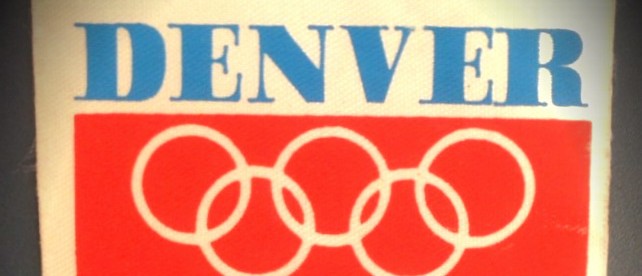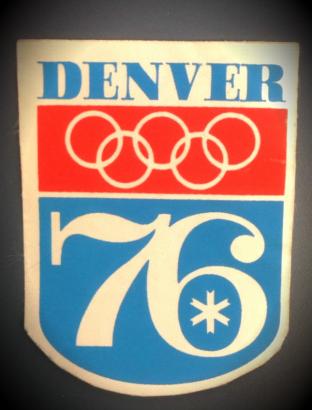Why Denver Said No to the 1976 Winter Olympics

In January of this year, the United States Olympic Committee decided that Boston would be the nation’s applicant for the 2024 Summer Olympics. As of this writing, only one other city — Rome — has applied for consideration, and by early 2016, many others will similarly start on their quest to host the Olympic Games. Even though hosting the event can quickly become a financial boondoggle, it is still a much sought-after honor — one any city would gladly welcome.
With one very notable exception.

In the 1960s, the Colorado state government formed a task force dubbed the Denver Olympic Organizing Committee (DOOC). The DOOC was charged with putting together the city’s Olympic bid, and came up with a plan which, if executed against, would cost about $14 million — a lot of money at the time (it’s about $57 million in today’s dollars) but relatively cheap compared to the price tag for contemporary Olympics. The bid was successful: on May 12, 1970, the International Olympic Committee awarded the 1976 Winter Games to Denver, Colorado — and the state and city politicians celebrated.
Well, most of the politicians celebrated. Some didn’t, and the voices of the many citizens who were against hosting the Games were quickly amplified.
It soon became clear that Denver’s proposal had some flaws — flaws which the DOOC certainly knew about during the application process. For example, NBC would later report that the DOOC wanted to hold ski events on a nearby mountain called Mount Sniktau, but the mountain couldn’t really support world-class skiiers, to the extent that “the DOOC had to have snow airbrushed on the mountain in the picture of Sniktau that accompanied the pitch to the IOC.” There were a number of other problems as well, the DOOC’s initial plan had to be modified. They relocated the skiing to Vail (100 miles west of Denver) and bobsledding events to Steamboat Springs (150 miles northwest), and made a bunch of other changes to numerous too list here.
This caught the eye of a state legislator named Dick Lamm (who would later serve as the state’s governor) for two reasons. First, the price tag shot up — the $14 million estimate was going to more than double, to $35 million. And second, most of Colorado was still undeveloped, and the major infrastructure efforts there were relatively new. For example, the Eisenhower Tunnel — which cuts through the Rocky Mountains on the way from Denver to Vail — wasn’t anywhere near complete yet. (Construction began in 1968 and wouldn’t complete until 1979.) Any efforts to connect the competition sites and to handle the influx of visitors would have to be rushed, and that would likely have adverse environmental impacts.
Lamm and Colorado had a way out. As Mental Floss reported, “the IOC had long asserted that it wouldn’t hold the games in Denver unless public money was available to help foot the bill,” and that required the passage of a bond measure. On Election Day, 1972, Colorado voters went to the polls to cast ballots in favor of, or against, a $5 million bond issuance to support the funding of the Games. The effort lost in a landslide, with 60% of voters rejecting the measure. Shortly thereafter, Denver said thanks, but no thanks, to the IOC. To date, this is the only time a city has successfully been awarded the Games, only to later turn down the opportunity to host them.
The IOC ultimately awarded the 1976 Winter Games to Innsbruck, Austria, in no small part because Innsbruck had hosted the 1964 Games and was, therefore, already well-suited to quickly prepare. Denver has considered applying for the Games again — it was briefly discussed as a possible applicant for the 2022 Winter Games, but the U.S. Olympic Committee decided to focus on the 2024 Summer Games instead.
 Bonus Fact: While Denver was the first city to find itself with the Olympics in their grasp, only to give it away, we may have a second one for the 2022 Winter Games — almost no one seems to want it. Only six cities bid for the games: Beijing, China, which hosted the 2008 Summer Games; Almaty, Kazakhstan, that nation’s largest city (by population); Oslo, Norway; Krakow, Poland; Lviv, Ukraine; and Stockholm, Sweden. Before the finalists were announced, though, Krakow, Lviv, and Stockholm all cancelled their bids, claiming a lack of public and/or political support due to the costs involved in hosting the event. On July 17, 2014, the IOC announced that Beijing, Almaty, and Oslo were the three final candidates (which they were by default anyway) with Oslo believed to be the resounding favorite. But by October, Oslo withdrew as well.
Bonus Fact: While Denver was the first city to find itself with the Olympics in their grasp, only to give it away, we may have a second one for the 2022 Winter Games — almost no one seems to want it. Only six cities bid for the games: Beijing, China, which hosted the 2008 Summer Games; Almaty, Kazakhstan, that nation’s largest city (by population); Oslo, Norway; Krakow, Poland; Lviv, Ukraine; and Stockholm, Sweden. Before the finalists were announced, though, Krakow, Lviv, and Stockholm all cancelled their bids, claiming a lack of public and/or political support due to the costs involved in hosting the event. On July 17, 2014, the IOC announced that Beijing, Almaty, and Oslo were the three final candidates (which they were by default anyway) with Oslo believed to be the resounding favorite. But by October, Oslo withdrew as well.
From the Archives: Mr. Plow: A Denver-area man run amok.
Related: A book on the “economic gamble” of hosting the Olympics, by noted sports economist Andrew Zimbalist.
